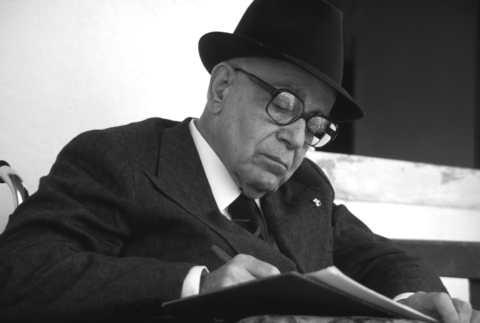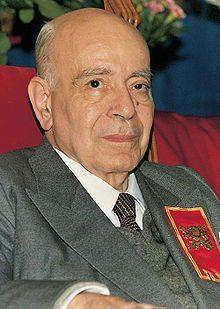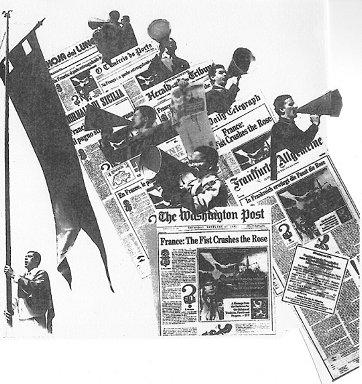
14 minute read
The Message
Introduction
Plinio Corrêa de Oliveira
I. The Center and the Right in the Face of French Socialism: Optimistic Illusion, Scope of the Defeat, and the Crossroads
1. The Illusion
2. A Look at the Real SP
3. The Great Factor in the Rise of Socialism in France: Abstention Prevails in the Center and the Right
4. The Crossroads: What Is to Be Done Now that the SP Has Won?
5. Choosing a Strategy: Aspects of French Socialism
II. Doctrine and Strategy in the Socialist Program for France
1. “Liberty, Equality, Fraternity” in the Socialist Program
2. The SP, the Center and the Right CHART I CHART II CHART III
3. The SP and Communism – The Strategy of Gradualism
4. Corporate Self-Management: a Socio-Economic Revolution
5. Self-Management Must Encompass Society and Man as a Whole
6. Why Corporate Reform Requires a Reform of Man
7. The Self-Managing Society and the Family
8. Leisure
9. Control of Lifestyles
10. Education
11. The Right of Property in the Self-Managing Regime CHART IV
12. Rural Property in the Socialist Program
III. The Doctrinal Core of the Socialist Program: Secularism – “Liberté, Egalité, Fraternité”
1. The Rights of Man in the Self-Managing Society: to Become Informed, Dialogue and Vote
2. Religion and religions in the Program
3. The Attitude of the French Episcopate Toward the SP
IV. Is this Interference in France’s Internal Affairs?
The Socialist Goals for France
V. The Glorious Future of France According to Saint Pius X
The Communiqué ― France: The Fist Crushes the Rose
THE FRENCH REVOLUTION at the end of the eighteenth century, the revolutionary tremors of 1848, the Paris Commune of 1871, and the ideological and temperamental explosion of the Sorbonne in 1968 were important milestones not only in the history of France but in the annals of the West as a whole.
Indeed, these movements, each in its own way and in its own specific proportions, gave international expression to aspirations and doctrines some of which arose in France and others elsewhere, but all of which had germinated in that country with an altogether unique capacity to spread. The historical events thus generated in France encountered and put in motion, in the spirits of the various peoples of the West, aspirations, tendencies and ideologies whose rise marked their psychological, cultural, political and socio-economic development in the centuries that followed.
Similar effects are now being felt from the unbloody but no less profound “revolution,” with its own chain of causes and effects, set in motion by the victory of the Socialist Party in last year’s May 10 elections and the consequent rise of Mitterrand to the Presidency. The crises affecting (in different degrees) communist and capitalist regimes are awakening all over the world tendencies and movements that boast of being especially modern and whose adherents believe that the clear, concise and victorious expression of everything, or nearly everything, they think and desire is inherent in the self-managing socialism now ruling in Paris. Naturally, this sets them on the way to achieving, in their own countries, similar successes to the profit and joy of international communism, of which self-managing socialism is but a trainbearer and fellow traveler.
This analysis, by Prof Plinio Corrêa de Oliveira, PLINIO CORRÊA DE OLIVEIRA was born in São Paulo, Brazil, in 1908. He received his doctorate in law from the Law School of the University of São Paulo. He is Professor of History of Civilization at the University College of the University of São Paulo and Professor of Modern and Contemporary History in the Colleges of São Bento and Sedes Sapientiae of the Pontifical Catholic University of São Paulo.

From his early youth he has distinguished himself as an orator, lecturer and Catholic journalist. He wrote regularly for the Catholic weekly Legionário and now writes for the monthly Catolicismo and the large daily newspaper Folha de S. Paulo One of the founders of the Catholic Electoral League, he was the Congressman who received the largest number of votes for the Federal Constitutional Convention of 1934. he was also President of the Archdiocesan Board of Catholic Action in São Paulo.
His principal works are:
In Defense of Catholic Action;
Revolution and Counter-Revolution;
Agrarian Reform: a Question of Conscience (in collaboration with other authors);
The Church and the Communist State: The Impossible Coexistence;
Unperceived Ideological Transshipment and Dialogue;
The Church in the Face of the Rise of the Communist Threat—An Appeal to the Silent Bishops;
Indian Tribalism: the Communist-Missionary Ideal for Twenty-First Century Brazil;
I am Catholic—Can I Oppose Agrarian Reform?
In 1960 he founded the BRAZILIAN SOCIETY FOR THE DEFENSE OF TRADITION, FAMILY AND PROPERTY (TFP) and has been President of its National Council ever since.
TFPs and similar organizations were later founded in twelve countries in the Americas and Europe, inspired by Revolution and Counter-Revolution and other works of Prof. Plinio Corrêa de Oliveira.
Introduction
On December 9, 1981, a striking six-page public interest advertisement appeared in the Washington Post and the Frankfurter Allegemeine Zeitung, the first two in a series of such publications to appear throughout the West. In the advertisements, the Societies for the Defense of Tradition, Family and Property (TFP) jointly addressed the public of their respective nations in a Message entitled “What Does Self-Managing Socialism Mean for Communism: A Barrier? Or a Bridgehead?” The Message was written by Prof. Plinio Corrêa de Oliveira , the founder and president of the Brazilian TFP. It exposes François Mitterrand’s program of self-managing socialism and it's ambitious designs for the West.

The Message was subsequently published in other leading newspapers in 18 countries of the Free World, bringing the total number of papers in which it appeared up to 44. To date, it has been published in Australia, Bolivia, Brazil, Canada, Chile, Columbia, Ecuador, England, Germany, Italy, Peru, Portugal, Spain, Switzerland, Uruguay and Venezuela.
The scope of the campaign against self-managing socialism was extended when a one page summary of the Message was published in six of South Africa’s major newspapers. Later, an advertisement summarizing the Message and its world-wide repercussions was published in three papers in Germany, two in Ireland, one in Austria, two in Australia, two in New Zealand, one in Costa Rica, and one in the Philippines.
What have been the effects of this weighty document since it was first published in December?

The amount of correspondence the TFP centers and bureaus have received is astounding, with thousands of letters and coupons requesting copies of the work to distribute to relatives, friends, libraries and universities. The majority of people expressed enthusiastic support for the campaign,, while the very few who showed disagreement sometimes couched it in insulting terms and almost always remained anonymous.
We can say that socialism, recently proud of the promotion it had been receiving abroad and its successes in many countries, has now taken a discreet and reserved attitude. Something has changed in the politico-ideological scene of the whole West.
What happened in France surprised and confused the optimistic and the naïve.
Since French self-managing socialism boasted of being democratic and open-minded in politics, the Message published without the slightest difficulty in the democratic press of the whole West should have encountered no obstacle in the major French newspapers of the center and right. But when the thirteen TFPs contacted the six largest Parisian dailies they received dry and inexplicable refusals. Of these papers, one of the most important that had signed a contract to publish the document broke it abruptly soon afterwards. The unanimous conduct of these papers is all the more inexplicable since the Message is a very large paid advertisement that no publishing company would normally refuse.
With the publication in France thus prevented, the thirteen TFPs had to content themselves with a a mass-mailing of 300,000 copies of the Message all over the country. This drew a large and enthusiastic response and, according to many observers, played an important role in enlightening French public opinion. There communist coalition in the recent regional elections.
The refusals to publish the Message gave rise to the Communiqué entitled “France: The Fist Crushes the Rose,” also by Prof. Plinio Corrêa de Oliveira. Published in 23 papers of 11 countries, it denounced to world public opinion the presumable interference of the French socialist government in the strange and despotic curtailment of the TFPs’ freedom of speech.
The Communiqué pointed out that since a socialist government can deprive any company owner of his rights, reduce him to a mere worker, and even expel him from his own company, the newspaper-owner’s independence from the government is only an illusion. This finding has a far-reaching scope: Except for the promise of freedom, all that is left to the self-managing regime is its similarity to communism.
Crusade’s readers will find the texts of both the Message and the Communiqué published here in their entirety.
About the Author: Plinio Corrêa de Oliveira
Many statesmen of our time, as well as highly-placed businessmen and prominent figures in science, culture and art, pride themselves in being prophets and apostles of the immense secularist and egalitarian Revolution which embraces all of today's world.
In the midst of this ubiquitous and apparently victorious laicist and egalitarian revolution appears the figure of Plinio Corrêa de Oliveira who has developed and lived ideals diametrically opposed to the current dominant tendencies. His great accomplishment is the Brazilian Society for the Defense of Tradition, Family and Property (TFP), the direct result of an entire life of activity as a writer, university professor, journalist and orator.
Plinio Corrêa de Oliveira, born in São Paulo, Brazil, on December 13, 1908, began his activities as a Catholic militant in 1928, at the age of 20. The TFP was founded only in 1960, after a long and careful process of preparation. Since then its ideals have been projected throughout practically all of South America, the United States, Canada, Europe and South Africa. Since 1977 the TFPs have had a representative office in Rome, the Ufficio Tradizione, Famiglia, Proprietà, and another in Washington since last year. A number of activities of the TFP have had surprising repercussions behind the Iron Curtain.
According to the myth - frequently accepted unquestioningly - the egalitarian Revolution finds, in new countries without tradition, a more fertile ground than in those where tradition still powerfully impregnates the laws, institutions and customs. In other words, the Americas would theoretically, be more fertile ground for the Revolution than Europe.
The spread of the TFPs has shaken this cliche. Formed initially in São Paulo, the "New York of Brazil," the TFP was made up of middle-aged men, many of whom came from old established families and from the upper middle-class. Their Christian, anti-socialist and anti-communist proclamation was received enthusiastically by young students and whitecollar workers, most of them descendants of working class immigrants from the most varied origins.
Thus, spreading throughout the so-called underdeveloped world, poor in tradition and resources but enriched with the gift of the Faith, the movement in favor of Tradition, Family and Property paradoxically reached super-industrial North America and traditional Europe.
The ideals of the Brazilian TFP, the same as those of the other TFPs, are set forth in the book Revolution and Counter-revolution, published by Plinio Corrêa de Oliveira in 1959, shortly before the founding of the Society. This book shows how certain forces and ideological currents began to unite in the Fifteenth Century to exterminate Christian Civilization and destroy the Catholic Church, and thus do away with the fruits of the Redemption of Our Lord Jesus Christ. Basically, these forces manipulate man's unbridled passions, especially pride and sensuality, and use sophistry, political intrigue and economic pressure to achieve their destructive end.
The first great and, so to speak, collective social explosion of these passions occurred in the Sixteenth Century with the Renaissance, affecting the cultural and artistic field, and with the Protestant Reformation, which affected the religious field. The action of pride as a revolutionary force in the religious field provokes the rejection of the supreme authority of the Pope as monarch of the Church, and that of the bishops as its hierarchy. In the humanist movement of the Renaissance the fanatic admiration for Greek and Roman art became a pretext to introduce naturalism, nudism, and immorality in general into the social customs of Christian Europe.
The cumulative effect of all these factors, nourished by pride and sensuality, resulted in another explosion, the French Revolution of 1789. This second revolution consisted mainly in raising the standard of equality, liberty and fraternity in order to force transformations in the hierarchical structure of the State analogous to those provoked by Protestantism in the structure of the Church.
Egalitarianism, and its corollary, liberalism, did not tarry in reaching the only sphere of Christian order that had remained more or less intact, the socioeconomic field. The germs of utopian socialism, already present in the French Revolution, rapidly spread through Europe until the middle of the nineteenth century, when they produced scientific socialism, or communism: the third revolution. This materialistic, atheistic and completely egalitarian revolution is now reaching its zenith and is already developing into a fourth: the proclamation of the freedom of all instincts. The rebellion of the Sorbonne in 1968 was a howling and characteristic preview of this fourth revolution.
In his book, Plinio Corrêa de Oliveira emphasizes that the great global Revolution, whose final phase we are now witnessing, is not above all a political or sociological phenomenon, but even more profoundly a moral and religious transformation which radiates its effects into all the aspects of the human personality. Whence the revolutionary germ spreads into the Church and the State, into social customs, art and culture, and into the political, social and economic order of today's life.
In the face of the revolutionary dragon, the Counter-revolution, as Plinio Corrêa de Oliveira sees it, is much more than a book: It is an ideal that invites modern man to completely reject all the aspects of the laicist and egalitarian Revolution and to restore the Christian order, the concretization in the temporal and religious spheres of the redemptive work of Our Lord Jesus Christ.
Every TFP fights in its respective country for this Counter-revolutionary ideal.
* * *
Plinio Corrêa de Oliveira is a descendant of long established families from the states of Pernambuco whence came his father, the lawyer João Paulo Corrêa de Oliveira, and São Paul - the most important Brazilian state - whence came his mother, Lucilia Ribeiro dos Santos. He attended high school in the Colegio São Luis run by the Jesuit Fathers of S. Paulo, and received his law degree from the famous Law School of the University of São Paulo.
At an early age he became interested in the philosophical, religious, and practical analyses of the contemporary crisis, its genesis and its consequences. He is a militant Catholic of profound conviction whose tongue and pen have always been at the service of causes where the interests of the Church and of Christian Civilization have been at stake. On leaving the university he began his professional and public career, at the same time becoming prominent as the most outstanding leader of the Catholic youth movement of São Paulo, which he entered in 1928.
At 24 he was elected to the Federal Constituent Assembly by the Catholic Electoral League, becoming its youngest member and the one receiving the greatest number of votes in the whole country.
Shortly thereafter, he accepted the chair of the History of Civilization in the University of São Paulo, and later also accepted the chair of Modern and Contemporary History in the Pontifical Catholic University of São Paulo.
He was the first president of the Archdiocesan Board of Catholic Action of the State of São Paulo.
In 1951, the then Bishop of Campos, Dom Antônio de Castro Mayer, founded the cultural monthly Catolicismo, Brazil's principal anti-progressivist and anti-leftist publication, on whose editorial staff Plinio Corrêa de Oliveira held an outstanding place from the beginning.
He also writes for the Folha de S. Paulo, one of the great Brazilian newspapers. There he takes up political, sociological and religious issues that have notable repercussion all over the country. These articles are also published in various other organs of the Brazilian press and of other countries in the Americas.
In addition to Revolution and Counter-Revolution, Plinio Corrêa de Oliveira wrote the following books:
In Defense of
Catholic
Action
(1943)
- This work, with a preface by Cardinal Massella, then Apostolic Nuncio in Brazil, is an acute analysis of the first beginnings of progressivist and leftist infiltration in Catholic Action. The book received a warm letter of praise, written in the name of Pius XII, by the then Substitute of the Secretariat of the Holy See, Msgr. Montini, the future Paul VI.
Agrarian Reform: A Question of Conscience (1960) - Written in collaboration with Dom Geraldo de Proenca Sigaud, Archbishop of Diamaritina, Dom Antonio de Castro Mayer, Bishop of Campos, and the economist Luis Mendonca de Freitas, this book criticized socialist and confiscatory agrarian reform and affirmed that it violated the
Commandments "Thou shalt not steal" and "Thou shalt not covet thy neighbor's goods." This study provoked debates in Brazil, and became a best seller going through four printings in twenty months. Political commentators affirmed that the book was responsible for the failure of the agroreformist aims of the Joao Goulart government. Translations were published in Argentina, Spain and Colombia.
The Declaration of Morro Alto (1964) - Written in collaboration with the same authors mentioned above, and following the principles laid out in Agrarian Reform: A Question of Conscience, this study presents a program of affirmative agrarian policy aiming to stimulate rural production, thus benefiting rural proprietors, laborers, and the nation in general.
The Church and the Communist State: the Impossible Coexistence (1963) - This work defends the thesis that it is impossible for the Church to coexist with a government which, while granting Her freedom of worship, prohibits Her from teaching that it is not licit to abolish private property, founded as it is on two precepts of the Decalogue. This work received a letter of praise signed by Cardinals Pizzardo and Staffa, from the Sacred Congregation for Seminaries and Universities, in which that high organ of the Holy See declares the doctrine expounded by the author a "most faithful echo" of the Pontifical Magisterium.
This essay has been translated into English, German, Spanish, French, Hungarian, Italian and Polish. It has gone through 36 editions and was published in its entirety in 38 newspapers or magazines of 13 different countries.
Unperceived Ideological Transshipment and Dialogue (1965) - This work describes the subtle process whereby many Catholics, through an irenic dialogue, are inadvertently transformed into communists. Five editions of this essay have been published in Portuguese, one in German, four in Spanish, and one in Italian. it has been published in its entirety by six newspapers of four countries.
The Church in the Face of the Rise of the Communist Threat - an Appeal to the Silent Bishops (1976) - A history of the forty years of the progressivist and "Catholic leftist" crisis in Brazil. It cites scandalously pro-communist poetry by Dom Pedro Casaldaliga, Bishop of São Felix do Araguaia. The book also contains a resume of the work of the Chilean TFP, The Church of Silence in Chile - The TFP Proclaims the Whole Truth, which denounces the action of Cardinal Silva Henriquez and many bishops and priests of that country who systematically favored communism. Four editions.
Indian Tribalism, the Communist Missionary Ideal for Brazil in the Twenty-first Century (1977) *Denounces a new facet of the progressivist onslaught in Brazil: Communist-Structuralist neomissiology. Seven editions besides its publication in Catolicismo.
I am Catholic - Can I Oppose Land Reform? (1981) - Analyzes the document The Church and Problems of the Land approved by the 18th General Assembly of the National Conference of Brazilian Bishops (CNBB), showing how that organ of the bishops is fighting for a land reform that favors the implantation of communism in Brazil. The book also contains a critique of the bishops' document from the economic standpoint by the economist Carlos Patricio del Campo. Three editions.
* * *
As an intellectual, Plinio Corrêa de Oliveira holds an undeniably outstanding place on the Brazilian scene. As a man of action, he is the most dynamic anticommunist leader in the country. His personality now projects all over Brazil and abroad as that of one of the most notable men of thought and action in our epoch of achievements and crises, of apprehensions, of catastrophes, but also of splendid affirmations of the Christian conscience.




